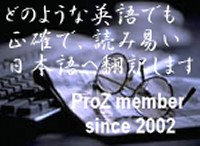To report site rules violations or get help, contact a site moderator:
You can also contact site staff by submitting a support request » How to translate formal documents like minutes of meetings or manuals from English to japanese.
| ||||||||||||||||||||||||||||||||||||||||||||||||||||||||||||
Your current localization setting
polski
Close search




